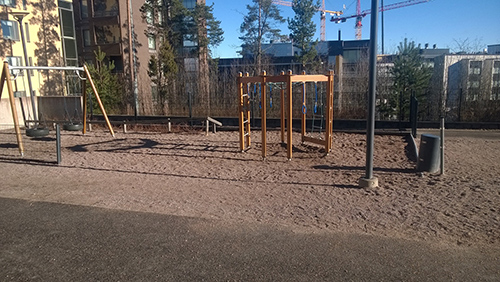
Forest-based children’s play yards can quickly boost their immune systems
Replacing gravel and stones in children’s outdoor play areas with ‘a mini forest’ can significantly help to boost youngsters’ immune systems.
An experimental study by the Natural Resources Institute Finland (Luke) showed that the immune system of daycare children aged three to five improved when forest undergrowth, lawn turf and planter boxes were added to yard areas of daycare centres.
A high level of hygiene, an urban lifestyle and an insufficient contact with nature reduce diversity in the organ system’s microbes. Homogeneity in microbes increases the risk of disorders in the immune system, such as atopy, diabetes, the coeliac disease and allergies.
Previous studies found that children who live in rural areas and are in contact with nature have a lower probability of catching an illness resulting from disorders in the immune system.
The report looked at 75 children in two Finnish cities
For the study, 75 daycare children of three to five years were monitored for one month at ten daycare centres in the Finnish cities of Lahti and Tampere. Changes in microbes in children who attended daycare centres with green yard areas were compared with children who attended normal daycare centres (no green yard area) or nature daycare centres (no green yard area but regular field trips).
It was shown that repeated contact with nature-like elements five times a week diversified the organ system’s microbes that offer protection against diseases transmitted through the immune system in daycare children.
Aki Sinkkonen, research scientist at Luke, led the study, and he said: “This recently published study of daycare children is the first in which these changes offering protection against diseases have been found when adding diversified aspects of nature to an urban environment. We also found that the intestinal microbiota of children who received greenery was similar to the intestinal microbiota of children visiting the forest every day.”
Biodiversity increases microbial diversity
Heikki Hyöty, professor of virology, and Juho Rajaniemi, professor of urban planning, led research groups from the University of Tampere also involved in the study. “The results of this study are encouraging when looking for new opportunities for the prevention of immune system disorders. Further studies aimed to reach this goal are already underway,” said Hyöty.

During the study, forest undergrowth, lawn turf and planter boxes, in which children planted and tended crops, were added to paved, tiled and gravel-coated yard areas at daycare centres.
Contact with nature repeated five times a week during one month increased microbial diversity in children’s skin. There were also changes in blood counts. Increases in gammaproteobacteria, which strengthen the skin’s immune defence, increased the content of the multifunctional TGF-β1-cytokine in blood and reduced the content of interleukin-17A, which is connected to immune-transmitted diseases.
‘Yard areas of all daycare centres should be made green’
The researchers say that the yard areas of all daycare centres should be transformed into green areas, as this will undoubtedly improve the regulation of children’s immune systems – and as quickly as one month. The motor skills of children and their ability to concentrate will also improve, and they will have a close relationship with nature.
To protect the natural development of the immune system, the green yard area model studied among daycare children should also be expanded to other daily activities. For example, a green yard area that attracts both children and adults can be built outside multi-storey buildings from shrubs and forest undergrowth. A decomposing pile of leaves does not need to be carried away at once, and there can also be a garden of decaying trees.
Sinkkonen added: “We should modify our daily life so that we can be in contact with nature. It would be best if children could play in puddles and everyone could dig organic soil. We could take our children out to nature five times a week to have an impact on microbes.”
The full report, Biodiversity intervention enhances immune regulation and health-associated commensal microbiota among daycare children, is published in ScienceAdvances journal.




